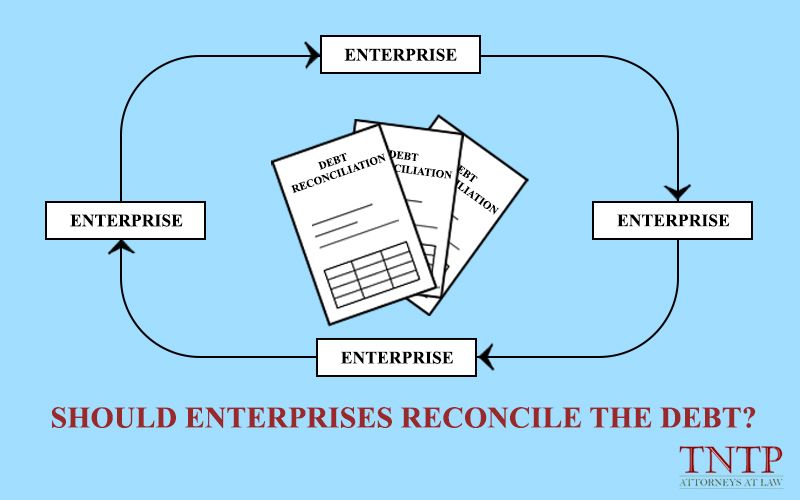Should enterprises reconcile the debt?

Debt reconciliation is that enterprises confirm the value of the debt which one party has obligation to pay to the other party. Debt reconciliation is often implemented in commercial business relationship. However, debt reconciliation is not mandatory for the parties. Therefore, many enterprises are still wondering about whether or not to reconcile the debt. Why do these enterprises have hesitation? Should enterprises reconcile the debt? This article will analys to answer the above questions.
1. What do enterprises think about debt reconciliation?
Nowadays, debt reconciliation is a common act in business activities. Accordingly, enterprises choose to reconcile debts because:
- The parties can follow the process of payment of the obliged party;
- The performance of the contract is clear and transparent;
- Debt reconciliation is an important basis when a dispute occurs;
- The demand of debt management, organizational system of that enterprise.
However, there are many situations enterprises are afraid of and do not want to reconcile debts because:
- The contract is signed between enterprises having close relationship, the performance of the contract mainly depends on trust;
- The obliged party does not agree, is sluggish in debt reconciliation;
- The parties claim that it is not necessary and they consider that the performance of the contract is clear enough.
Thus, it can be seen that until now, there are still 02 views on whether enterprises should reconcile the debt or not.
2. Assess the advantages and disadvantages of debt reconciliation
Through assessing the advantages and disadvantages of debt reconciliation, enterprises can have an objective view on this issue. Thereby, enterprises can conclude whether to reconcile debts.
– Advantages:
- In case of arising a dispute, debt reconciliation is one of the most important evidence to identify the value of the debt when the entitled party litigates at the competent authority:
In order that debt reconciliation has legal effect when litigating, enterprises kindly refer to the article “Issues of debt reconciliation in civil procedure”.
In addition, bank statements of the payment process are also important evidence. If bank statements match with debt reconciliation and the entitled party can explain the payment process to the competent authority, the win rate in litigation is strongly high.
- Debt reconciliation can be implemented easily and quickly:
The parties often misunderstand that debt reconciliation is complicated and wastes much time because both parties have to sign and send the other party 01 copy. However, currently, signing and sending documents between enterprises are implemented usually, and delivering letters, documents is convenient, does not take much time. The content of debt reconciliation can be implemented fast if the enterprise has an accountant.
Debt reconciliation is also not required to implement monthly, it can be done quarterly, annually, according to each payment, depending on the agreement of the parties.
– Disadvantages:
- It is hard to reconcile the debt if one of the parties does not cooperate:
In some cases, the obliged party does not agree or prolongs the time to reconcile the debt. This can cause consequences when the entitled party litigates but cannot submit the debt reconciliation as an evidence because the debt reconciliation is not legally valid.
- The person who signs the Debt reconciliation often does not have authority:
The authority to sign the Debt reconciliation must be the legal representative of the enterprise; if the signing and performance of the Contract have arisen from branch, the authority belongs to legal representative of the branch; or the authorized representative.
Nevertheless, enterprises often let the chief accountant or accountant sign for confirmation. In case a dispute arises, there will have authorities accepting the legal validity of the debt reconciliation, while other authorities do not. This depends on the opinion of each authority. At that time, the enterprise will lose the effort and time to explain and convince the competent authority to accept the legal validity of the debt reconciliation.
3. Should enterprises reconcile the debt?
According to TNTP’s experience, enterprises should reconcile the debt because:
- Debt reconciliation helps enterprises to manage the debts of Clients and Partners well. Sometimes, a lot of small debts will become a big debt. If enterprises manage strictly debt reconciliation and have plan to collect these debts, the financial situation of enterprises will be more stable and better.
- Debt reconciliation helps the parties to avoid the risk of arising dispute. When debt reconciliation is implemented strictly, the performance of the contract is clear, the ability to arise disputes will be significantly reduced.
- Disadvantages of debt reconciliation can be fixed:
About the authority to sign the debt reconciliation, the parties can proactively regulate or request clients, partners having authority to sign properly.
In the event that debt reconciliation is unsuccessful because one party does not cooperate, most of it is caused by subjective reasons from one party. If one of the parties does not agree or avoid reconciling the debt, the other party can send the payment request. These official letters have legal validity and will contribute to determining the value of the debt when a dispute arises and a party initiates a lawsuit at the competent authority.
Above are our legal sharings of whether enterprises should reconcile the debt or not. We hope this article is useful for you.
Best regards.
Join Fanpage Dispute Settlement And Debt Collection to have more useful legal knowledge.
TNTP & Associates International Law Firm
Lawyer Nguyen Thanh Ha
Email: ha.nguyen@tntplaw.com



